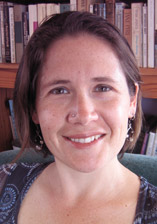
In the Know
Contributor’s Marginalia: Alexandra Teague on “Noir” by Kathleen Winters
Kathleen Winters’ “Noir” initially charmed me with its fantastic humor and sly revisioning of the oh-so-classic story of the Fall. I’ve been drawn for years to feminist takes on myths and fairytales—think Anne Sexton’s Transformations or Carol Ann Duffy’s The World’s Wife—and how could I not fall for a hardboiled-slang-talking Eve?
Clever. Slyly brilliant, actually.
By taking on the style of Noir (which is, after all, a genre often described as being defined by its style), Winters’ Eve reveals the Fall from Eden as the original Noir script. Rather than beginning after World War II, the fallen, cynical world of Noir was already there with history’s first femme fatale. And how could she help being the femme fatale? It’s the woman’s role in Noir—in Raymond Chandler’s words, “the world gone wrong” in which Noir characters exist. Just as all the animals in the garden “knew the score,” the reader is invited to see that this is how it is, has always been, was at the moment of—but intriguingly also even before—the Fall. Knowledge—the central, cursed acquisition of the Fall—what Eve shouldn’t seek—is played up beautifully and deconstructed in Winters’ wordplay. “Rat knew / Gnu knew.” Who knows what? What are free will and predestination here? What is knowledge in a world where “Gnu” and “knew” echo off one another, and everyone knows the “score” from the second line?
Even Eve’s initial creation is tinged with Noir: Snake calls Eve an “ignorant bimbo,” “expendable,” and then—so crucially and cleverly—“a rib.” Ending the list and the line, Adam’s “rib” from which Eve is created becomes just another piece of hardboiled slang, revealing God’s work, the very creation of woman-kind, as stacked against her from a start. She’s never been more than a pawn—“ribbed up,” in Noir talk, meaning “set up / arranged for.”
Who can Eve trust in a world like this? Snake is a reptile—and then we’re left hanging—to come down on the humorous but telling “was a pigeon, too.” Snake the informer. Snake the duplicitous animal who is and is not what he seems. In Film Noir: From Berlin to Sin City, Mark Bould writes of the “coincidences, hidden interrelations, unclear and confused motives [that] abound” in Noir. And in Winter’s brief poem, we get both the sense that this is all pre-determined / part of the score, or the script, and that the language and characters are duplicitously trying to confuse / complicate. “Gnu/knew,” “reptile/pigeon” (one literal, the other, of course, pure Noir idiom), and the animals themselves given the knowledge that in a non-inverted world, we might think would belong to the humans. Where is Adam? Apparently not one of the animals in the know: the man about to be entrapped by the femme in her fatal error.
Carefully laid rhymes play a key role in drawing out these confusions—in creating, linguistically, “hidden interrelations” between the poems’ statements. After three repetitions of “knew” we end the first sentence (in the midst of line 5) with “do.” The key choice—“what to do”—echoing off the knowing/knew that has preceded. And after this caesura, we get the “whisper” and “lisp” of Snake whispering off one another before “rib” ends that sonic run. And then we get two short sentences in a row that return to the initial rhyme: “he / Was a pigeon, too” followed by the wonderful, coy and telling, final line “What could I do?” Of course there’s nothing Eve can do but bite the apple. The rhyme has determined this. The very nature of Noir has determined this: the Garden, from the start, shot in stark blacks and whites (which become, I would argue, in Winters’ interestingly colorless poem, the strokes of fairly simple language and the reliance on the flat tone and hardboiled slang). And of course the poem becomes commentary on story, too; we all know the story of the Fall, so any telling now has to be already tinged with where it goes. We can’t return to innocence any more than Eve can avoid that apple: that ultimate heist.
 Alexandra Teague is the author of
Alexandra Teague is the author of